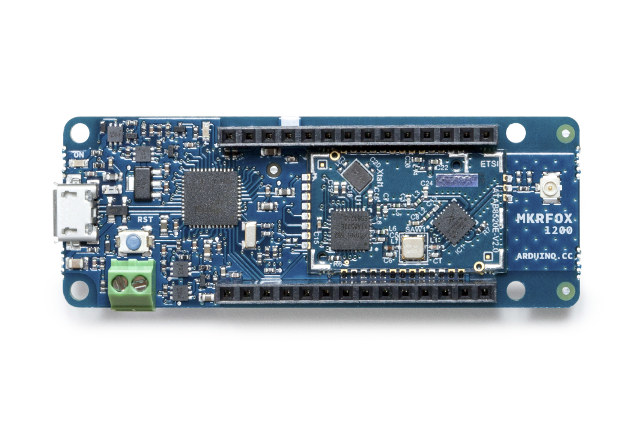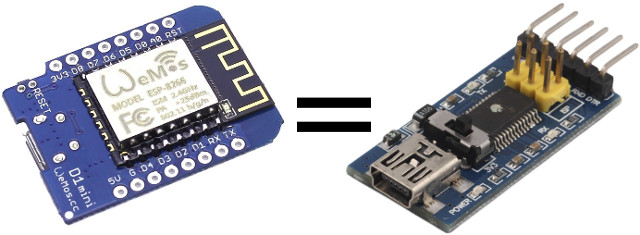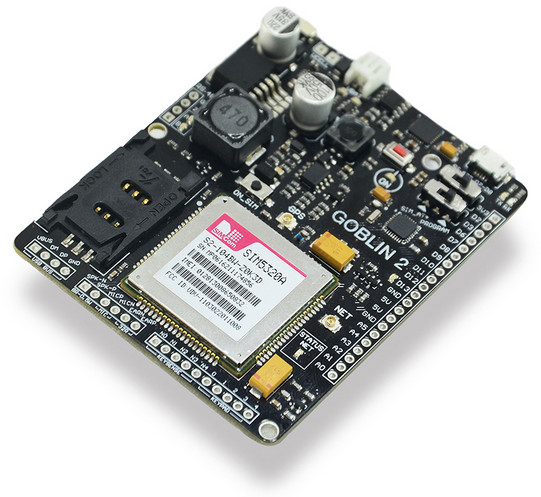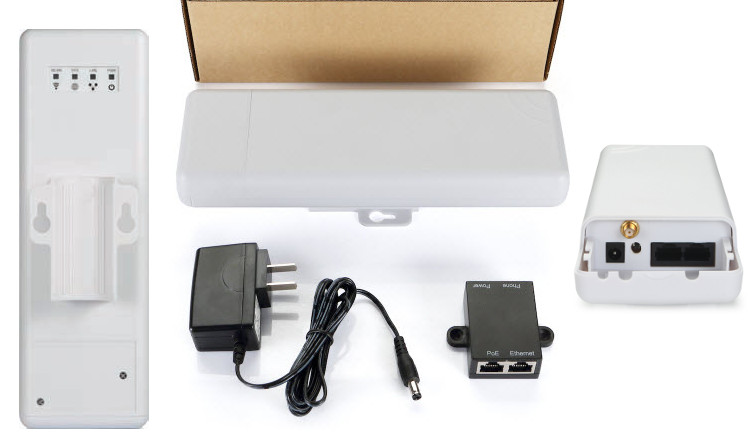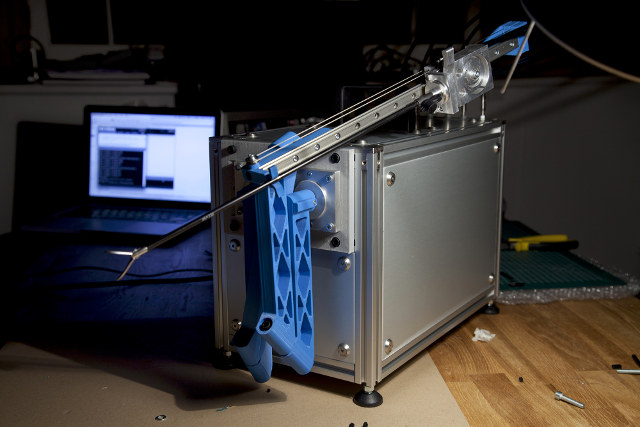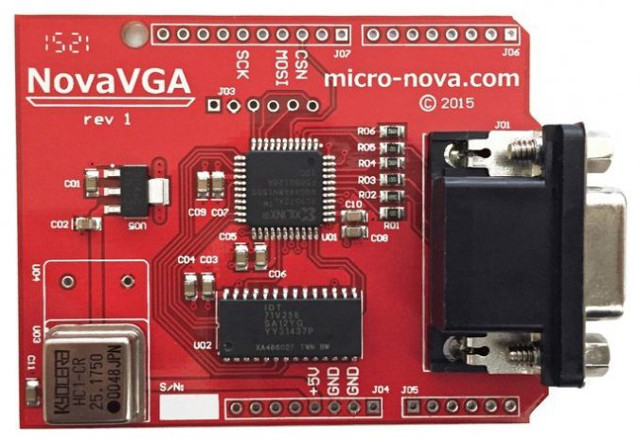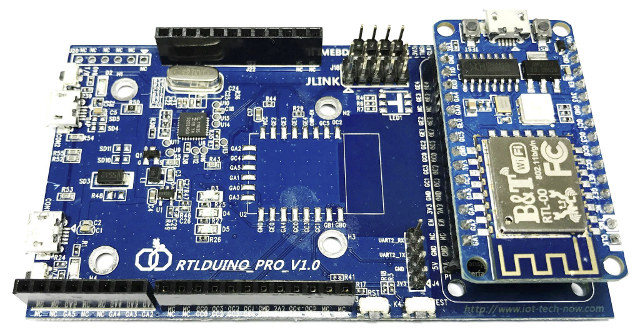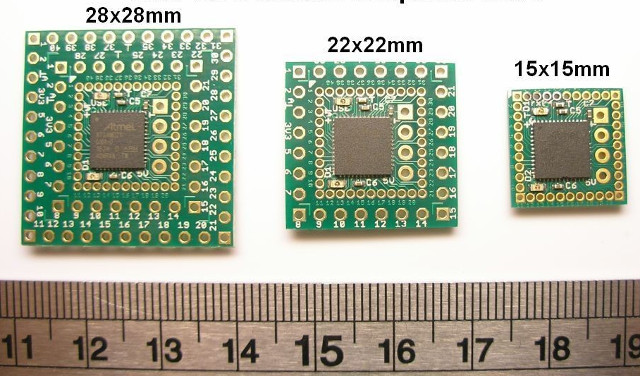Arduino MKRFOX1200 is the first official Arduino board to feature LPWAN technology thanks to a Microchip ATA8520 Sigfox module combined with a Microchip SAMD21 ARM Cortex M0+ micro-controller, all that in the same form factor as MKRZero or MKR1000 boards. Arduino MKRFOX1200 specifications: MCU – Microchip SAMD21 ARM Cortex-M0+ MCU @ 48 MHz with 256KB flash, 32KB SRAM Connectivity – Microchip AT8520 Sigfox module operating @ 868 MHz with 2dB “GSM” antenna connected to u.FL connector 2x 14-pin headers for I/Os: 8x digital I/O 8x external interrupts (0, 1, 4, 5, 6, 7, 8, A1 -or 16-, A2 – or 17) 7x analog inputs (8/10/12-bit ADC) 1x analog out (10-bit DAC) 12x PWM pins ((0, 1, 2, 3, 4, 5, 6, 7, 8, 10, A3 – or 18 -, A4 -or 19) 1x UART, 1x SPI, 1x I2C 3.3V operating voltage DC Current per I/O Pin 7 mA USB – […]
Transform Your ESP8266 Board into a USB to Serial Board Easily with Arduino Serial Bypass Sketch
USB to serial boards are necessary to program and debug boards, and/or access the serial console, and while they are very cheap, you may be in a situation where you don’t have any around, but you do have some Arduino compatible boards. It’s been possible to transform an Arduino board into a USB to TTL debug for several years using ArduinoSerialBypass.ino sketch, but I’ve been informed this also works on ESP8266 boards such as Wemos D1 Mini. The sketch could not be simpler:
|
1 2 3 4 5 6 7 8 9 |
void setup() { pinMode(0,INPUT); pinMode(1,INPUT); } void loop() { } |
The code simply makes sure that Tx and Rx pins are set as inputs in order not to disturb the serial connection as explained below: This code makes the Arduino not interfere with pins 0 and 1 which are connected to RX and TX on the FTDI chip. This allows the data coming from the FTDI USB 2 Serial chip to flow directly to another device. […]
Goblin 2 Arduino Compatible IoT Board Includes SIM5320A 3G & GPS Module
Veracruz, Mexico based Verse Technology has recently launched Goblin 2, an Arduino compatible IoT development, based on Atmel/Microchip ATmega328P MCU, featuring a built-in SIM5320A 3G and GPS module, supporting RS-485 communication, and providing 3.3/5 and 24V power output. Goblin 2 board specifications: MCU – Microchip Atmel ATMega328P AVR MCU @ 16 MHz with 1KB EEPROM, 32kB Flash, 2kB SRAM Wireless connectivity via Simcom SIM5320A USB 2.0 module: Dual-Band UMTS/HSDPA 900/2100MHz Quad-Band GSM/GPRS/EDGE 850/900/1800/1900MHz 1x SIM card slot High accuracy 16 channel GPS Expansion I/Os 6x ADC input with 10 bits resolution 10x digital in/out including 5 PWM RS-485 protocol @ 10Mbps for up to 256 nodes on the bus Header to Keypad, microphone and speaker for SIM I/O Misc – 8 LEDs for power, battery, networking, RS485, UART, plus one user LED; Power switch, RS-485 /GPIO switch, program / SIM AT+ switch Power Supply – 5V via micro USB port, […]
Dragino OLG01 Outdoor Single Channel LoRa Gateway Runs OpenWrt, Supports Passive PoE
Dragino Technology, a Shenzhen based startup focusing on the Internet of Things, had already designed LoRa shields & Hats for Arduino & Raspberry Pi boards which can be useful for LoRa nodes, but the company has now launched Dragino OLG01 LoRa gateway running OpenWrt that communicates with nodes over LoRa, and to the cloud using WiFi, Ethernet, or 3G/4G. Dragino OLG01 specifications: WiSoC – Atheros AR9331 MIPS processor @ 400MHz System Memory – 64MB RAM Storage – 16MB flash MCU – Atmel ATMega328P AVR MCU with 32KB flash, 2KB SRAM Connectivity 802.11 b/g/n WiFi with antenna 2x 10/100M Ethernet with support for passive PoE Optional 3G/4G module connected to internal USB socket (TBC) Semtech SX1276/78 LoRa wireless module + SMA connector (antenna not provided) up to 5~10 km range USB – 1x USB 2.0 host port Power Supply – 12V DC power jack or PoE Three models are offered with […]
Open Surgery Initiative Aims to Build DIY Surgical Robots
Medical equipments can be really expensive because of the R&D involved and resulting patents, low manufacturing volume, government regulations, and so on. Developed countries can normally afford those higher costs, but for many it may just be prohibitively expensive. The Open Surgery initiative aims to mitigate the costs by “investigating whether building DIY surgical robots, outside the scope of healthcare regulations, could plausibly provide an accessible alternative to the costly professional healthcare services worldwide”. The project is composed of member from the medical, software, hardware, and 3D printing communities, is not intended for (commercial) application, and currently serves only academic purposes. Commercial surgical robots can cost up to $2,000,000, but brings benefits like smaller incisions, reduced risks of complications and readmissions, and shorter hospital stays thanks to a faster recovery process. There have already been several attempts within the robotics community to come up with cheaper and more portable surgical […]
NovaVGA Shield Adds VGA Output to Arduino Boards
Arduino boards are convenient to control I/Os, link LEDs, and display info on small LCD displays, but if you want to output data to a larger monitor, it’s a bit more complex. NovaVGA shield for Arduino simplify the task of outputting data to a VGA monitor over SPI. NovaVGA shield hardware specifications: CPLD – Xilinx XC9572XL CPLD, user programmable via JTAG interface. SRAM Framebuffer – 160×120 pixels @ 6-bit color (2^6 = 64 possible colors) VGA Output – 640×480 @ 60Hz physical resolution (25.175MHz pixel clock) Interface with MCU – SPI mode 1 interface (consumes only three Arduino pins) Header pins not included MicroNova provides an Arduino library with various examples such as color palette, Mandelbrot, Tetris and text console, as well as a user’s guide and PDF schematics that can all be downloaded directly on the product page. NovaVGA shield sells for $29 on Tindie or directly on MicroNova […]
RTL8710 Ameba Arduino Development Board and Ameba Arduino v2.0.0 SDK Released
We’ve already seen a NodeMCU lookalike board called RTLDuino based on Realtek RTL8710AF ARM Cortex M3 WiSoC earlier this month, that can be programmed with a community supported Arduino port also called rtlduino via a JLink SWD debugger, but now Realtek has just launched Ameba RTL8710 Arduino board, and released Ameba Arduino v2.0.0 SDK which brings official Arduino support to RTL8710AF platforms. There appears to be two versions of the development kit: RTLDUINO_PRO_V1.0 and REALTEK-AMEBA_RTL8710_V2.0, but based on the user manual they seem to be identical, and as you can see from the above picture, it includes a baseboard and the aforementioned RTLDuino board. RTL8710 Ameba Arduino HDK key features: SoC – Realtek RTL8710AF ARM Cortex-M3 MCU @ 83 MHz with 802.11 b/g/n WiFi, hardware SSL engine connected to the baseboard via: RTLDuino board through female header B&T RTL-00 module soldered on module footprint USB – 2x micro USB ports, […]
SAM 15×15 is a Tiny Arduino Zero Compatible Board based on Atmel SAMD21G18 MCU
Arduino Zero is an official Arduino board based on UNO r3 form factor but using Atmel SAMD21G18 ARM Cortex M0+ MCU instead of an AVR MCU. Albert van Dalen has decided to design a compatible module based on the same MCU, and called SAM 15×15, as its size can be trimmed down to as low as 15×15 mm. SAM 15×15 comparison with Arduino Zero and Uno boards. SAM 15×15 Arduino Zero Arduino Uno Microcontroller ATSAMD21G18A ATSAMD21G18A ATmega328P Digital I/O Pins digitalWrite digitalRead 34 20 14 Analog Output Pins (PWM) analogWrite 24 10 6 Analog Input Pins (ADC) analogRead 14 6 6 ADC resolution 12-bit 12-bit 10-bit 10-bit DACs 1 1 0 Flash Memory 256KB 256KB 32KB SRAM 32KB 32KB 2KB EEPROM 32KB (emulated in Flash) 32KB (emulated in Flash) 1KB CPU Speed 48MHz 48MHz 16MHz The board allows for three form factors to match your specific needs: 28 x 28mm […]


